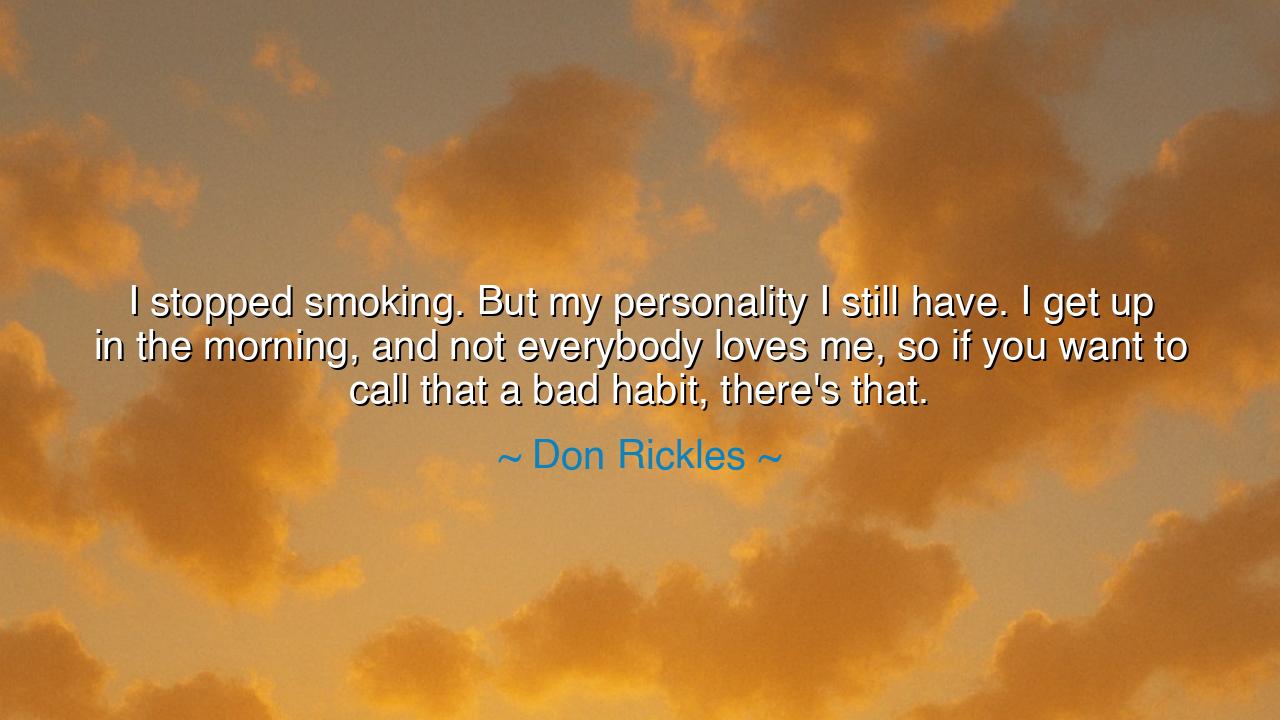
I stopped smoking. But my personality I still have. I get up in
I stopped smoking. But my personality I still have. I get up in the morning, and not everybody loves me, so if you want to call that a bad habit, there's that.






Hear the voice of Don Rickles, the master of sharp wit, who once declared with disarming honesty: “I stopped smoking. But my personality I still have. I get up in the morning, and not everybody loves me, so if you want to call that a bad habit, there’s that.” What appears at first a jest is, in truth, a reflection of life’s deeper realities—of the persistence of self, of the limits of pleasing others, and of the courage to remain authentic.
When he says, “I stopped smoking,” Rickles acknowledges the power of discipline, the ability to cast aside a harmful habit. Yet he quickly turns our attention to something greater: the unchanging essence of his personality. For though one may shed the weight of vice, the core of who we are—our humor, our bluntness, our rough edges and radiant sparks—remains. This is a teaching for all generations: health may change, habits may shift, but character endures.
The heart of his words lies in the admission that “not everybody loves me.” Here is where his jest carries the sting of truth. Too often, people live enslaved by the desire for universal approval. They bend, they break, they soften themselves until they are no longer themselves—only to find that still, not all will love them. Rickles, with a shrug and a laugh, reminds us that disapproval is not a failure. To be disliked by some is not shame, but proof that one has lived authentically, without masking the self.
This teaching echoes through history. Consider Diogenes the Cynic, who lived in Athens with fearless disregard for convention. He cared little whether others admired him; he spoke truth, often harshly, and scorned the pursuit of empty praise. Like Rickles, Diogenes knew that to live freely is to invite criticism, but also to keep the dignity of one’s true self intact. Both men, though separated by centuries, shared the same courage: to endure being unloved in order to remain unmasked.
Rickles’ quip about bad habits is also a sly twist of wisdom. He tells us that while he conquered smoking, his nature—the sharp tongue, the biting humor—remains. And if the world calls that a flaw, he wears it gladly. For what is called a “bad habit” by others may, in truth, be the source of one’s gift, one’s uniqueness, one’s way of lighting the world. His comedy, though sometimes stinging, brought laughter to millions; what some disdained was also what many adored.
The deeper meaning is this: do not confuse perfection with authenticity. To strip away every habit, every edge, every quirk in pursuit of universal love is to erase the very color of one’s soul. Better to stand flawed yet genuine, than polished into emptiness. Rickles teaches that even when one vice is conquered, the rest of our humanity remains—and it is that humanity, in all its contradictions, that gives life its flavor.
The lesson for us is clear: strive to grow, yes—cast off what truly harms you, as Rickles cast off smoking. But do not strive to be loved by all, nor to erase the essence of your personality in pursuit of approval. Instead, live so that when you rise in the morning, you can say: I am still myself.
The practical action is this: reflect each day on what parts of yourself you must discipline, and what parts you must defend. Let go of the habits that steal your health and your spirit. But guard fiercely the traits that make you who you are, even if they are not universally admired. For in the end, it is better to be disliked for your truth than to be loved for your disguise. And like Don Rickles, you may laugh at the world, knowing that authenticity itself is the highest form of freedom.






AAdministratorAdministrator
Welcome, honored guests. Please leave a comment, we will respond soon